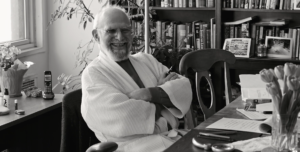
Screenshot of Oliver Sacks from the new documentary
The new documentary Oliver Sacks: His Own Life is the first whole-life film biography of the neurologist famous for some sixteen books, including Awakenings (also a film with Robin Williams, as Sacks), The Man Who Mistook His Wife for a Hat, and An Anthropologist on Mars. Sacks died from a recurrence of cancer, at the age of 82, in 2015.
The film, if it could be said to have a reason for being other than to celebrate an accomplished life, is made to show how Sacks, as perennial outsider, was better able to understand the experience of others, including those with neurologic disorders. More generally it views his work in terms of the mind/brain problem, and the subjectivity of our inner lives in the outer world.
The film is available streaming on Kino Marquee, a service that allows viewers to send a portion of the “admission fee” to the brick-and-mortar theater of their choice.
The documentary shows the hardship in Sacks’ childhood, including being shipped off to the English countryside for safety during the war, and his fraught relationship with his doctor mother, who, despite their close bond, called him an “abomination” when his father outed him against his will. Sacks is shown developing intense interests, even life-long obsessions (the periodic table), which tended to make him a solitary child but a natural student.
After getting his medical degree at Oxford, he emigrated to the United States to do an internship and residency in California. During this time Sacks found weightlifting as a healthy way to de-stress, but also became addicted to amphetamines and stormed across the countryside at full throttle on motorcycles. The film does not romanticize or condone his unhealthy behavior (much), and as a result the view of Sacks is not entirely sympathetic. His peers and supervisors watch him wander off in the middle of rounds; he is distracted, flighty, odd. He abandons work without much explanation and heads off to self-assigned personal retreats. As he himself notes, he is about the last person anyone expected to be a success in his field. He had few intimate relationships and became celibate for thirty-five years in the middle portion of his life.
After his training he moved to New York. While serving as a neurologist for Beth Abraham Hospital’s chronic-care facility in the Bronx he encountered the patients frozen since the ’20s by encephalitis, who would become the subject of Awakenings (1973). In finding storytelling as a fundamental part of his own approach to the practice of medicine, he seems also to have found his life’s direction and confidence, and the film shows plenty of evidence that Sacks was a great help and comfort to his patients. Though his colleagues did not embrace his contribution for decades, Sacks became beloved by general readers. Late in life he fell in love and had an enduring relationship, which his friends describe as a great balancing-out of all that came before.
It is a happy story. The documentary is framed by interviews Sacks did after his diagnosis of terminal metastatic cancer in 2015. He is surrounded by friends and colleagues; he reads from his drafts; he is forthcoming but also plays the joker by telling stories, such as how in his loveless days he cooled his “turgid member” by thrusting it into orange Jell-O for relief. There is no footage of this, but plenty of him consulting with patients, looking Brando-ish/rakish/Hemingwayesque, and crawling on the floor (looking very much like Robin Williams), trying to get the perspective of an orangutan.
At the end of the documentary, while others tear up, he says gratefully that he has had “an intercourse with the world.”
“Above all I have been a sentient being, a thinking animal, on this beautiful planet. And this in itself has been an enormous privilege and adventure.”
